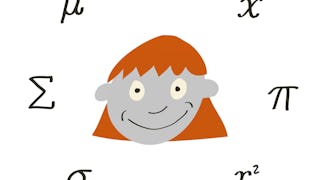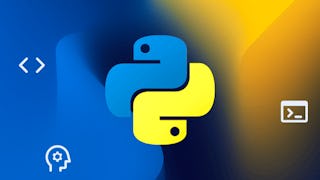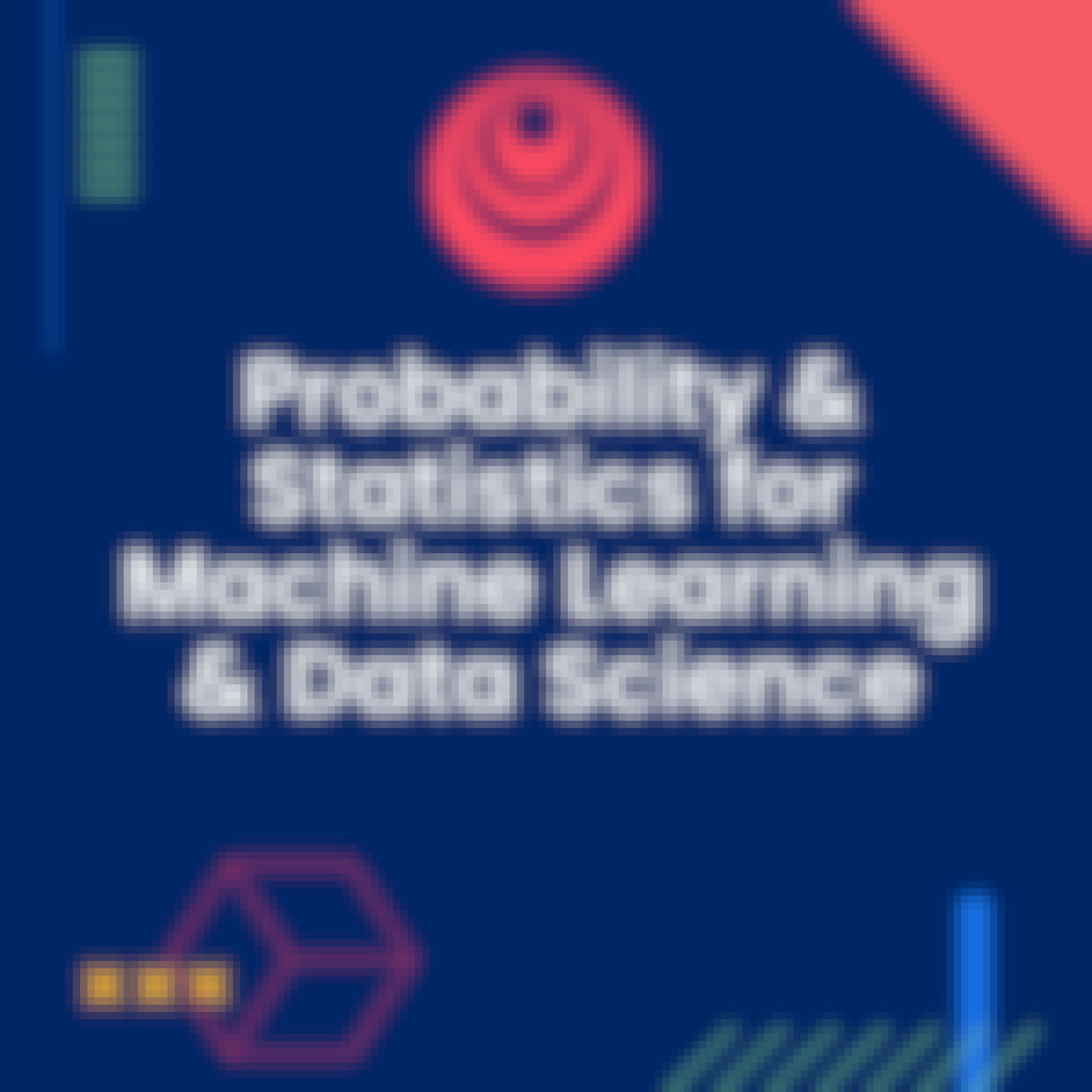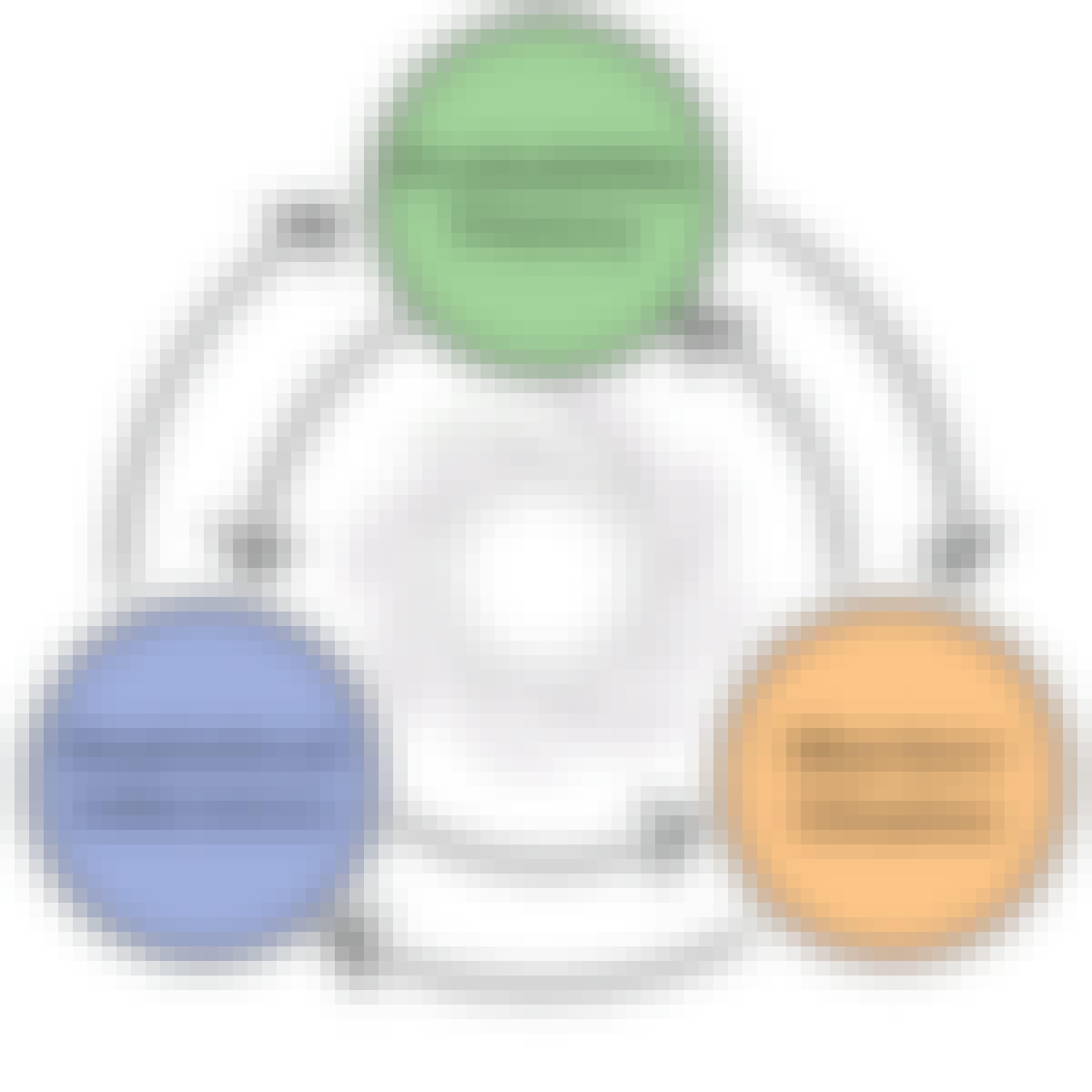- Browse
- Statistics
Statistics Courses
Statistics courses can help you learn data analysis, probability theory, hypothesis testing, and regression techniques. You can build skills in interpreting data sets, making informed predictions, and conducting surveys. Many courses introduce tools like R, Python, and Excel, that support performing statistical analyses and visualizing results. You'll also explore key topics such as descriptive statistics, inferential statistics, and experimental design, equipping you with the knowledge to tackle real-world data challenges.
Popular Statistics Courses and Certifications
 Status: NewNewStatus: Free TrialFree TrialA
Status: NewNewStatus: Free TrialFree TrialAArizona State University
Skills you'll gain: Statistical Methods, Bayesian Statistics, Statistics, Probability & Statistics, Data Storage Technologies, Analytical Skills, Exploratory Data Analysis, Data Storage, Database Software, Estimation, Data-Driven Decision-Making, Applied Machine Learning, Supervised Learning, Markov Model, Logistic Regression, Statistical Hypothesis Testing, Predictive Modeling, Simulations, Simulation and Simulation Software, Regression Testing
Intermediate · Specialization · 3 - 6 Months
 Status: PreviewPreviewS
Status: PreviewPreviewSStanford University
Skills you'll gain: Descriptive Statistics, Statistics, Statistical Methods, Sampling (Statistics), Statistical Analysis, Data Analysis, Statistical Modeling, Statistical Hypothesis Testing, Regression Analysis, Statistical Inference, Probability, Exploratory Data Analysis, Quantitative Research, Probability Distribution
4.6·Rating, 4.6 out of 5 stars4.3K reviewsBeginner · Course · 1 - 3 Months
 Status: Free TrialFree Trial
Status: Free TrialFree TrialSkills you'll gain: Bayesian Statistics, Descriptive Statistics, Statistical Hypothesis Testing, Statistical Inference, Sampling (Statistics), Data Modeling, Statistics, Probability & Statistics, Statistical Analysis, Statistical Methods, Statistical Modeling, Marketing Analytics, Tableau Software, Data Analysis, Spreadsheet Software, Analytics, Time Series Analysis and Forecasting, Regression Analysis
4.8·Rating, 4.8 out of 5 stars386 reviewsBeginner · Course · 1 - 3 Months
 Status: Free TrialFree TrialU
Status: Free TrialFree TrialUUniversity of Amsterdam
Skills you'll gain: Statistical Hypothesis Testing, Statistics, Scientific Methods, Quantitative Research, Data Analysis Software
4.6·Rating, 4.6 out of 5 stars4.6K reviewsBeginner · Course · 1 - 3 Months
 Status: Free TrialFree TrialG
Status: Free TrialFree TrialGGoogle
Skills you'll gain: Sampling (Statistics), Statistical Hypothesis Testing, Descriptive Statistics, Advanced Analytics, Data Analysis, Probability Distribution, Statistics, Probability, A/B Testing, Statistical Analysis, Data Science, Statistical Inference, Statistical Programming, Jupyter, Python Programming, Technical Communication
4.8·Rating, 4.8 out of 5 stars872 reviewsAdvanced · Course · 1 - 3 Months
 Status: Free TrialFree TrialU
Status: Free TrialFree TrialUUniversity of Michigan
Skills you'll gain: Statistical Hypothesis Testing, Sampling (Statistics), Statistical Modeling, Statistical Methods, Statistical Inference, Bayesian Statistics, Data Visualization, Plot (Graphics), Data Literacy, Statistics, Matplotlib, Statistical Software, Probability & Statistics, Model Evaluation, Seaborn, Statistical Analysis, Jupyter, Statistical Machine Learning, Statistical Programming, Python Programming
4.6·Rating, 4.6 out of 5 stars3.3K reviewsBeginner · Specialization · 1 - 3 Months
What brings you to Coursera today?
 Status: Free TrialFree TrialR
Status: Free TrialFree TrialRRice University
Skills you'll gain: Statistical Hypothesis Testing, Microsoft Excel, Statistical Methods, Pivot Tables And Charts, Regression Analysis, Statistics, Descriptive Statistics, Probability & Statistics, Graphing, Spreadsheet Software, Probability Distribution, Business Analytics, Statistical Modeling, Statistical Analysis, Statistical Inference, Excel Formulas, Data Analysis, Data Presentation, Model Evaluation, Sample Size Determination
4.7·Rating, 4.7 out of 5 stars13K reviewsBeginner · Specialization · 3 - 6 Months
 Status: Free TrialFree TrialD
Status: Free TrialFree TrialDDeepLearning.AI
Skills you'll gain: Descriptive Statistics, Bayesian Statistics, Statistical Hypothesis Testing, Probability & Statistics, Sampling (Statistics), Probability Distribution, Probability, Statistical Inference, A/B Testing, Statistical Analysis, Statistical Machine Learning, Data Science, Statistical Modeling, Exploratory Data Analysis, Statistical Visualization
4.6·Rating, 4.6 out of 5 stars678 reviewsIntermediate · Course · 1 - 4 Weeks
 Status: Free TrialFree TrialJ
Status: Free TrialFree TrialJJohns Hopkins University
Skills you'll gain: Statistical Hypothesis Testing, Sampling (Statistics), Regression Analysis, Bayesian Statistics, Statistical Analysis, Probability & Statistics, Statistical Inference, Statistical Methods, Statistical Modeling, Linear Algebra, Probability, Probability Distribution, R Programming, Biostatistics, Data Science, Statistics, Mathematical Modeling, Data Analysis, Data Modeling, Applied Mathematics
4.4·Rating, 4.4 out of 5 stars787 reviewsAdvanced · Specialization · 3 - 6 Months
 Status: Free TrialFree TrialU
Status: Free TrialFree TrialUUniversity of Amsterdam
Skills you'll gain: Qualitative Research, Scientific Methods, Statistical Analysis, Statistical Hypothesis Testing, Research, Research Design, Sampling (Statistics), Research Reports, Science and Research, Interviewing Skills, Data Analysis, Data Collection, Research Methodologies, Social Sciences, Surveys, Quantitative Research, Statistics, Regression Analysis, Statistical Inference, R Programming
4.6·Rating, 4.6 out of 5 stars7.9K reviewsBeginner · Specialization · 3 - 6 Months
 Status: NewNewStatus: Free TrialFree TrialU
Status: NewNewStatus: Free TrialFree TrialUUniversity of Colorado Boulder
Skills you'll gain: Probability, Statistical Inference, Estimation, Statistical Methods, Probability & Statistics, Statistics, Probability Distribution, Markov Model, Data Literacy, Statistical Analysis, Sampling (Statistics), Bayesian Statistics, Applied Mathematics, Artificial Intelligence, Generative AI, Data Science, Theoretical Computer Science, Data Analysis, Machine Learning Algorithms, Mathematical Theory & Analysis
Build toward a degree
4.4·Rating, 4.4 out of 5 stars337 reviewsIntermediate · Specialization · 3 - 6 Months
 Status: Free TrialFree TrialJ
Status: Free TrialFree TrialJJohns Hopkins University
Skills you'll gain: Shiny (R Package), Rmarkdown, Model Evaluation, Regression Analysis, Exploratory Data Analysis, Statistical Inference, Predictive Modeling, Statistical Hypothesis Testing, Machine Learning Algorithms, Plotly, Interactive Data Visualization, Probability & Statistics, Statistical Machine Learning, Data Presentation, Data Visualization, Statistical Analysis, Statistical Modeling, R Programming, Machine Learning, GitHub
4.4·Rating, 4.4 out of 5 stars7.2K reviewsIntermediate · Specialization · 3 - 6 Months
In summary, here are 10 of our most popular statistics courses
- Modern Statistics for Data-Driven Decision-Making: Arizona State University
- Introduction to Statistics: Stanford University
- Statistics Foundations: Meta
- Basic Statistics: University of Amsterdam
- The Power of Statistics: Google
- Statistics with Python: University of Michigan
- Business Statistics and Analysis: Rice University
- Probability & Statistics for Machine Learning & Data Science: DeepLearning.AI
- Advanced Statistics for Data Science: Johns Hopkins University
- Methods and Statistics in Social Sciences: University of Amsterdam
Frequently Asked Questions about Statistics
Statistics is the branch of mathematics that deals with collecting, analyzing, interpreting, presenting, and organizing data. It is crucial because it provides the tools and methodologies to make informed decisions based on data. In an increasingly data-driven world, understanding statistics allows individuals and organizations to identify trends, make predictions, and validate hypotheses. Whether in business, healthcare, social sciences, or technology, statistics plays a vital role in guiding strategies and improving outcomes.
A background in statistics can open doors to various career opportunities. Jobs in this field include data analyst, statistician, biostatistician, market researcher, and quantitative analyst. These roles often require the ability to interpret complex data sets and communicate findings effectively. Additionally, industries such as finance, healthcare, and technology are increasingly seeking professionals skilled in statistics to help drive decision-making processes and improve operational efficiency.
To pursue a career in statistics, you should develop a range of skills. Key competencies include proficiency in statistical software (like R or Python), a solid understanding of probability theory, data visualization techniques, and the ability to interpret and communicate statistical results. Additionally, critical thinking and problem-solving skills are essential, as they enable you to approach data analysis with a strategic mindset. Familiarity with data collection methods and experimental design is also beneficial.
There are many excellent online statistics courses available that cater to different levels of expertise. For beginners, the Foundations of Probability and Statistics Specialization offers a solid introduction. For those looking to apply statistics in data science, the Data Science: Statistics and Machine Learning Specialization is highly recommended. Additionally, the Business Statistics and Analysis Specialization provides practical skills for applying statistics in a business context.
Yes. You can start learning statistics on Coursera for free in two ways:
- Preview the first module of many statistics courses at no cost. This includes video lessons, readings, graded assignments, and Coursera Coach (where available).
- Start a 7-day free trial for Specializations or Coursera Plus. This gives you full access to all course content across eligible programs within the timeframe of your trial.
If you want to keep learning, earn a certificate in statistics, or unlock full course access after the preview or trial, you can upgrade or apply for financial aid.
Learning statistics can be approached through various methods. Start by identifying your learning style—whether you prefer structured courses, hands-on projects, or self-study. Online platforms like Coursera provide a range of courses that cater to different preferences. Engage with practical exercises to apply what you learn, and consider joining study groups or forums to discuss concepts with peers. Regular practice and real-world application will reinforce your understanding and build confidence.
Typical topics covered in statistics courses include descriptive statistics, probability theory, inferential statistics, hypothesis testing, regression analysis, and data visualization. More advanced courses may explore Bayesian statistics, multivariate analysis, and statistical modeling. These topics provide a comprehensive foundation for understanding how to analyze and interpret data effectively, which is essential for making informed decisions in various fields.
For training and upskilling employees, courses like the Statistics and Applied Data Analysis Specialization are particularly beneficial. This specialization focuses on practical applications of statistics in real-world scenarios. Additionally, the Business Statistics and Analysis Specialization equips learners with essential skills for data-driven decision-making in business contexts. These courses can enhance workforce capabilities and drive organizational success.










